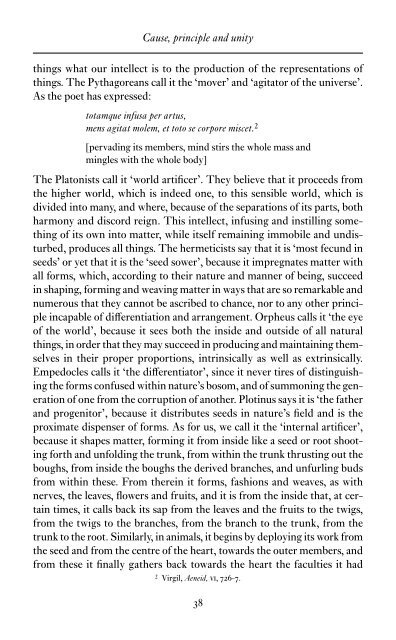You also want an ePaper? Increase the reach of your titles
YUMPU automatically turns print PDFs into web optimized ePapers that Google loves.
<strong>Cause</strong>, principle and unity<br />
things what our intellect is to the production of the representations of<br />
things. The Pythagoreans call it the ‘mover’ and ‘agitator of the universe’.<br />
As the poet has expressed:<br />
totamque infusa per artus,<br />
mens agitat molem, et toto se corpore miscet. 2<br />
[pervading its members, mind stirs the whole mass and<br />
mingles with the whole body]<br />
The Platonists call it ‘world artificer’. They believe that it proceeds from<br />
the higher world, which is indeed one, to this sensible world, which is<br />
divided into many, and where, because of the separations of its parts, both<br />
harmony and discord reign. This intellect, infusing and instilling something<br />
of its own into matter, while itself remaining immobile and undisturbed,<br />
produces all things. The hermeticists say that it is ‘most fecund in<br />
seeds’ or yet that it is the ‘seed sower’, because it impregnates matter with<br />
all forms, which, according to their nature and manner of being, succeed<br />
in shaping, forming and weaving matter in ways that are so remarkable and<br />
numerous that they cannot be ascribed to chance, nor to any other principle<br />
incapable of differentiation and arrangement. Orpheus calls it ‘the eye<br />
of the world’, because it sees both the inside and outside of all natural<br />
things, in order that they may succeed in producing and maintaining themselves<br />
in their proper proportions, intrinsically as well as extrinsically.<br />
Empedocles calls it ‘the differentiator’, since it never tires of distinguishing<br />
the forms confused within nature’s bosom, and of summoning the generation<br />
of one from the corruption of another. Plotinus says it is ‘the father<br />
and progenitor’, because it distributes seeds in nature’s field and is the<br />
proximate dispenser of forms. As for us, we call it the ‘internal artificer’,<br />
because it shapes matter, forming it from inside like a seed or root shooting<br />
forth and unfolding the trunk, from within the trunk thrusting out the<br />
boughs, from inside the boughs the derived branches, and unfurling buds<br />
from within these. From therein it forms, fashions and weaves, as with<br />
nerves, the leaves, flowers and fruits, and it is from the inside that, at certain<br />
times, it calls back its sap from the leaves and the fruits to the twigs,<br />
from the twigs to the branches, from the branch to the trunk, from the<br />
trunk to the root. Similarly, in animals, it begins by deploying its work from<br />
the seed and from the centre of the heart, towards the outer members, and<br />
from these it finally gathers back towards the heart the faculties it had<br />
2 Virgil, Aeneid, VI, 726-7.<br />
38

















